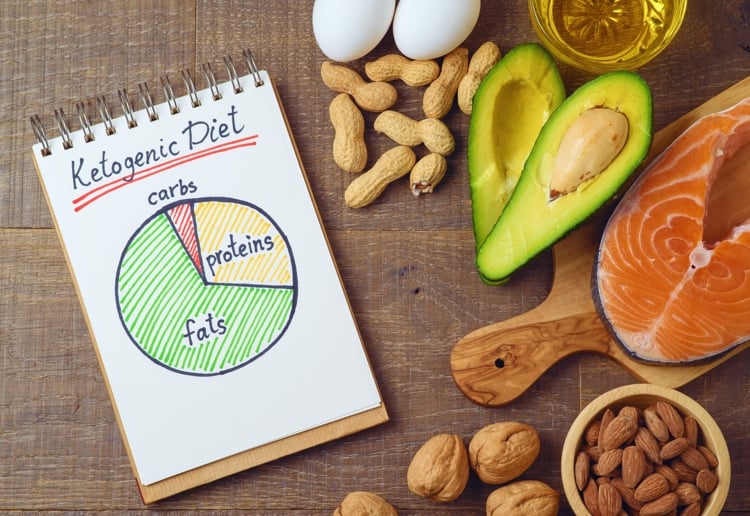It seems every second person is now following keto (short for ketogenic diet) and raving about the outcomes. So what is it, how does it work, and is it worth considering? Or is it just another one of “those” diets, you know the ones.
What does it mean to go Keto?
Basically, it means cutting carbs. On a ketogenic diet you limit daily carbohydrate consumption to under 50g per day (although there are different versions of this, some even stricter) and after 3-4 days you wind up in ketosis. But it’s not quite that simple either. You also need to monitor your intake of protein, as too much will stop the process working. Essentially you need to consume the majority of your calories from fat, around 80% of your total intake.
Ketosis is where your body converts from using “glucose” as its primary fuel source, and instead begins oxidising fat (breaking it down and using for energy) leaving you with ketones in your blood.
This type of diet has been used for decades for kids suffering from epilepsy as it can help reduce the occurrence of seizures. It’s only now that people are turning to ketosis as a weight loss strategy.
What foods do you need to avoid?
Obviously carbohydrates, sugar, and anything that converts to glucose. Think fruit, bread, rice, pasta, cereals, legumes, crackers and any form of sweet indulgence. When you think that just two slices of bread will exceed the maximum allowed volume of carbohydrate for one day, you get an idea how strict you need to be.
Why the hype?
Fancy being able to eat huge amounts of fat and at the same time lose weight and supposedly improve your health. That’s the attraction when it comes to the ketogenic diet.
Yes, it does help people lose weight, despite laying on the butter, cream, oils and juicy cuts of steak.
It even helps suppress your appetite, as this is one of the effects of being in ketosis, making it even more attractive to those desperate to lose weight!
What are the long-term outcomes?
Ok so here is where we throw in a dash of reality. Unfortunately, despite all the claims regarding the weight loss benefits, the longer term (12 month) trials comparing Ketosis to more traditional low fat diets, there is no significant difference in achieved weight loss. Dang. There are also exceptionally high dropout rates for those following a ketogenic diet, which demonstrates just how challenging the diet is over a longer period of time.
Surprising to many, ketosis appears to help when it comes to reducing total cholesterol, blood triglycerides and is associated with increased levels of HDL (good) cholesterol. This is all despite the large amounts of fat consumed.
What have you got to lose?
Possibly your bugs. That’s the biggest concern when it comes to the ketogenic diet. What are the long-term effects on gut microbiome? More and more research is showing just how important a healthy microbiome is to improving immunity and reducing inflammation – a precursor to many forms of illness. Interestingly it seems the gut microbiome also plays a key role in weight management, although the mechanisms are still not entirely understood.
Maintaining a healthy microbiome is far more involved than simply taking a daily probiotic supplement. Dietary fibre, prebiotics and probiotics naturally produced in fermented food are all important role players. A diet missing wholegrains, legumes and fresh fruit will limit your ability to support your microbiome health, with the full long-term implications still unknown.
The bottom line…
If you are looking for long-term sustainable results, that will improve all areas of health and that protects your gut health, ketosis is not the best option. For those with high cholesterol, following a Mediterranean dietary pattern will likely be just as or even more effective.
There are still too many unanswered questions when it comes to the long-term outcomes of ketosis. When used for weight loss, 12 month outcomes appear modest at best, and dropout rates are high.
It seems Ketosis is just another one of “those” diets, you know the ones…
Have you tried the KETO diet? Tell us in the comments below.





















9:14 am
11:06 pm
9:15 am
6:11 am
10:35 pm
7:48 pm
2:48 pm
11:42 am
11:07 am
7:06 am
12:57 am
8:26 pm
9:49 pm
11:30 am
7:58 am
-

-
-
Ellen replied
- 15 May 2019 , 12:00 pm

Reply7:11 am
5:51 am
10:34 pm
8:41 pm
-

-
-
musicmum replied
- 28 May 2019 , 1:03 am
Reply7:56 pm
- 1
- 2
- »
Post a commentTo post a review/comment please join us or login so we can allocate your points.